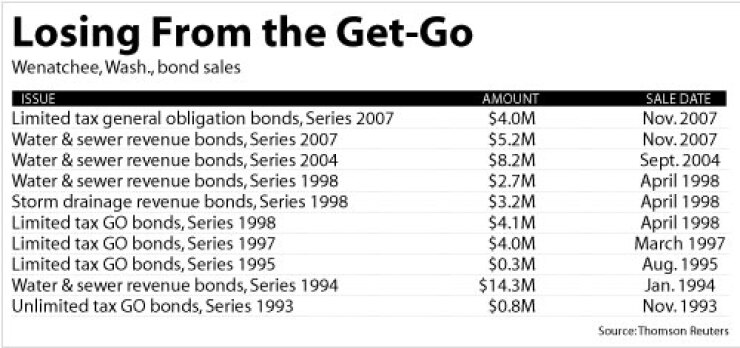
SAN FRANCISCO — Wenatchee, Wash., finds itself on the hook for a hockey arena that didn’t pencil out the way consultants said it would.
The Greater Wenatchee Regional Events Public Facilities District, which built the Town Toyota Center, needs to sell long-term bonds to cover $42 million needed when three bond anticipation notes come due at the end of the year.
So far Wenatchee has covered interest payments on the notes under a contingency loan agreement, because arena revenue hasn’t covered debt-service costs.
After the upcoming sale of the long-term bonds, Wenatchee officials expect to be stuck paying more than $3 million annually to cover the principal and interest payments on the debt through a new contingency loan agreement. The city’s annual budget is around $20 million.
“It will be devastating to the city in that we will be covering that much of the debt,” said Mark Calhoun, finance director for both the city and the public facilities district. “Frankly, that wasn’t anticipated by the City Council when they voted to back the bonds.”
The Public Facilities District, created in 2006 to develop the center, includes Chelan and Douglas counties and eight other municipalities. Wenatchee, with a population of about 30,000, is the district’s largest city.
The district issued three series of notes in 2008 to fund the construction of the center: $5 million of limited sales-tax Bans, $5.5 million of revenue and special-tax Bans and $31 million of revenue and special-tax Bans.
Standard & Poor’s rated the notes SP-1-plus when they were issued and has maintained the rating.
The 4,300-seat Town Toyota Center opened in October 2008 to host a local junior hockey squad, semi-pro arena football and indoor soccer teams, concerts, and other events.
The center has lost money since it opened, with an operating loss of $1.6 million in 2008 and $2.5 million in 2009, according to the most recent audited financial report.
“Based on current revenue streams and operating losses, it is unknown if the district will be able to refinance the three bond anticipation notes by their due date,” the auditor wrote in a report in November.
The notes, which mature at the end of the year, have required $2.2 million of annual interest payments. The center has only been able to contribute $600,000 to the annual payments using sales tax revenues, leaving the rest of the cost to the city.
Calhoun said the company that helped build and then manage the center, Global Entertainment Corp., made unrealistic revenue projections. C.H. Johnson Consulting also reviewed and green-lighted the estimates.
GEC’s “revenue projections were grossly overstated; they weren’t even in the realm of reality,” Calhoun said.
After first-year revenues came up well short of expectations, the center fired GEC, hired a general manager, and took over operations. Since, the center has seen a modest uptick in revenue but just enough to cover operations.
Now Wenatchee is struggling to make the budget cuts to make room for the debt-service payments for the center.
It has cut 15 staff positions since 2009 and plans to make further reductions in the upcoming 2012 budget, Calhoun said.
The city is now considering taking a tax measure to voters to shore up the gap.
Wenatchee has $12.8 million of non-voter approved limited-tax general obligation bonds and $3.1 million of voter-approved GO bonds outstanding.
Moody’s Investors Service rates the limited-tax bonds A1 and the voter-approved bonds Aa3.
The debt-service payments are “a big deal for us,” Calhoun said. “It is going to make for a difficult 2012.”





